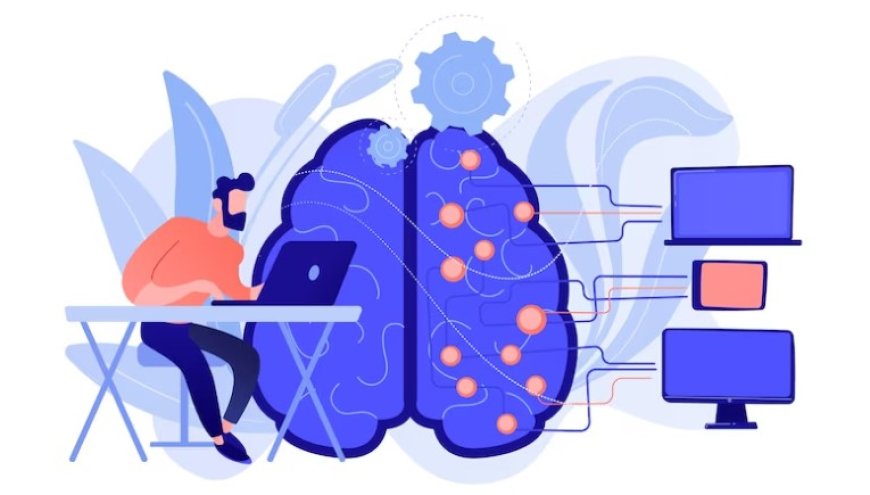Top 10 AI skills
Discover the top 10 AI skills essential for success in today's tech landscape. From machine learning to natural language processing, master the key abilities.

Artificial intelligence (AI) is a fast-developing science, and experts in the field are in great demand. Knowing which talents are in demand right now is essential for success as you deal with your AI career.
As this active science develops further, professionals with expertise in AI are finding themselves in unprecedented demand. The intersection of AI and practical applications has created a scenario where staying tuned in the current demands of the industry is not just helpful but necessary for anyone guiding a career in this field.
So, what are the top 10 AI skills that are currently in demand, and how can professionals develop and showcase these skills to improve their career prospects in the field of Artificial Intelligence? Let's find out what it is.
1. Machine Learning (ML) Expertise:
Gaining a profound understanding of algorithms and statistical models is fundamental for professionals in the field of artificial intelligence. These components serve as the bedrock for enabling machines to enhance their performance iteratively, adapting to patterns and refining their responses over time. The intricate nature of these algorithms involves a deep comprehension of mathematical concepts, data structures, and computational processes.
Also, professionals seeking expertise in artificial intelligence find it advantageous to familiarize themselves with popular machine learning frameworks such as TensorFlow and PyTorch. These frameworks provide essential tools and resources for implementing and deploying machine learning models effectively. TensorFlow, developed by Google, and PyTorch, maintained by Facebook, are widely used in the AI community for their flexibility, scalability, and extensive community support.
2. Programming Languages Proficiency:
proficiency in programming languages up to par, especially in languages like Python, R, and Julia. These languages play a pivotal role in the field of Artificial Intelligence (AI) and are considered essential for professionals seeking to advance their careers in this domain. Python, known for its simplicity and versatility, is extensively used in AI development for tasks such as building machine learning models, data analysis, and scripting. R, with its statistical computing capabilities, is valuable for data analysis and visualization, making it a sought-after skill in AI projects. Julia, recognized for its speed and efficiency, is gaining popularity for its application in high-performance computing and data science.
To improve your career prospects in AI, it's crucial to invest time in honing your programming skills in Python, R, and Julia. This may involve engaging in hands-on coding projects, participating in relevant online courses or workshops, and staying informed about language-specific updates and best practices. By showcasing your proficiency in these languages, you position yourself as a versatile and capable AI professional, ready to contribute to the changing surroundings of artificial intelligence.
3. Natural Language Processing (NLP):
Given the rising integration of Artificial Intelligence (AI) in language-based applications, possessing strong Natural Language Processing (NLP) skills is paramount. This skill set involves a comprehensive understanding of working with text data, proficiency in sentiment analysis, and the ability to generate language. As AI continues to play a pivotal role in processing and understanding human language, professionals with NLP expertise are well-positioned to contribute to the development of intelligent systems that can interpret, analyze, and generate human-like text. NLP skills are highly valued in various industries, making them a key asset for individuals looking to advance their careers in the field of AI.
4. Computer Vision:
Artificial Intelligence (AI), proficiency in image and video recognition, along with capabilities in object detection, is highly prized. Understanding visual data is fundamental for AI applications, enabling systems to process and analyze images and videos to extract meaningful insights. Professionals with expertise in these areas are well-positioned to contribute to advancements in computer vision, a key component of AI that has applications ranging from facial recognition to autonomous vehicles. Demonstrating competency in image and video processing enhances your value in the competitive surroundings of AI, where the ability to harness visual data is increasingly crucial.
5. Data Science and Analytics:
The foundation of success in the realm of Artificial Intelligence (AI) lies in a professional's proficiency in data handling. AI heavily relies on data, making expertise in data preprocessing, analysis, and interpretation indispensable skills for AI professionals. The ability to effectively manage and derive insights from datasets is fundamental to developing robust AI models and systems. Professionals equipped with strong data skills play a crucial role in transforming raw data into meaningful information, driving the innovation and effectiveness of AI applications.
6. Deep Learning Knowledge:
Concepts such as Convolutional Neural Networks (CNNs) and Recurrent Neural Networks (RNNs) are crucial in Artificial Intelligence (AI). CNNs excel in tasks involving image recognition and classification, while RNNs are essential for processing sequential data, making them fundamental in natural language processing and time-series analysis. Proficiency in these deep learning architectures equips professionals to tackle complex AI challenges, from computer vision applications to language processing tasks. Developing expertise in neural networks involves hands-on experience, staying updated on advancements in deep learning, and practical application in real-world projects, positioning individuals as adept contributors to the cutting-edge field of AI.
7. Problem-Solving and Critical Thinking:
Approaching challenges with a problem-solving mindset is a cornerstone for AI professionals. The ability to think critically and adapt algorithms to address real-world problems is highly prized in the field. In a surroundings that is variable like artificial intelligence, where solutions are often complex and multifaceted, cultivating these skills is key to navigating and overcoming the diverse challenges that arise. AI professionals who excel in problem-solving contribute to innovative solutions and are well-positioned for success in this strongly evolving field.
8. AI Ethics and Bias Mitigation:
In the changing surroundings of Artificial Intelligence (AI), the ethical dimensions are becoming increasingly crucial. Professionals in AI must not only comprehend the societal impact of AI technologies but also possess the ability to design systems that actively mitigate biases. Understanding and addressing ethical implications ensures responsible AI development, fostering trust in the technology and promoting its positive influence on society.
9. Collaboration and Communication:
In the field of Artificial Intelligence (AI), collaboration across disciplines is common. Strong communication skills are vital for successfully implementing and deploying AI solutions. Being able to convey complex technical concepts to non-experts and collaborate seamlessly with professionals from various backgrounds enhances the overall effectiveness of AI projects. Sharpening your communication skills, whether it's explaining AI models to stakeholders or collaborating with cross-functional teams, is key to advancing your career in the dynamic and collaborative world of AI.
10. Continuous Learning and Adaptability:
In the swiftly evolving environment of AI, thriving in your career requires a commitment to continuous learning. As the field advances strongly, staying updated on industry trends and adapting to new technologies becomes paramount. Professionals who embrace a mindset of perpetual learning position themselves to not only keep pace with the dynamic nature of AI but also to contribute meaningfully to its ongoing development. This commitment not only enhances individual expertise but also ensures sustained success in the ever-changing world of artificial intelligence.
Possessing a combination of technical expertise, adaptability, and ethical considerations will set professionals on a path to success. By focusing on these top 10 AI skills in demand, individuals can position themselves as valuable contributors to the field and enhance their career prospects in the exciting world of Artificial Intelligence.
The field of artificial intelligence (AI) offers a wide range of skills that are highly sought after in today's job market. These top 10 AI skills encompass various areas such as machine learning, natural language processing, computer vision, and data analysis. By acquiring these skills, individuals can unlock numerous opportunities in industries like healthcare, finance, and technology. As AI continues to advance and shape our world, having a strong foundation in these skills will be crucial for professionals looking to thrive in this strongly evolving field. Whether it's developing innovative algorithms, creating intelligent systems, or leveraging big data, mastering these AI skills will undoubtedly pave the way for a successful and fulfilling career.





































